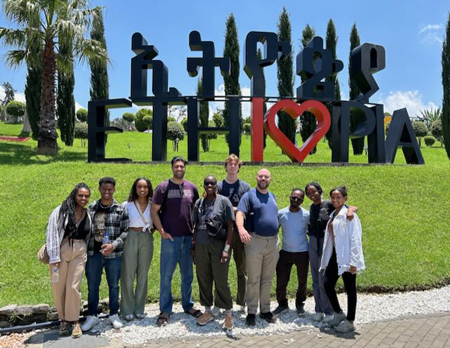Studying abroad offers students the chance to improve their language skills, to better understand different viewpoints, and to make global connections to what they’ve learned on campus. The University of Washington Information School now offers five study abroad programs and a variety of opportunities for students to deepen their learning with a global perspective.
Since beginning to offer study abroad programs in 2008, the iSchool has expanded on its course offerings. In 2024 the iSchool will lead journeys to the Netherlands, South Korea, the United Kingdom, Ethiopia and Portugal. Programs are led by iSchool faculty members and typically take place over three to four weeks. This year all iSchool study abroad programs are summer programs, beginning either in June or August, and they are designed to complement what students learn in their iSchool coursework.
“The Netherlands study abroad was the perfect addition to my education,” said Mendy Miller, a Master of Library and Information Science student who participated in the “iSchool Netherlands: Dutch Designs: Innovation in Library, Museum and Information Services in the Netherlands” program in the summer of 2023. “It was really meaningful to connect with other students in an intimate environment on topics that I feel are critical, like understanding colonialism, what it means to own people’s sacred items, and the complicatedness of repatriation, as well as innovative ways people are moving forward. I am also grateful that this opportunity allowed me to connect with some of my ancestral homelands and learn about the culture, eat good food with my cohort and make lasting memories,” Miller said.

Some iSchool students also study with other UW-affiliated study abroad programs. Informatics major Sirak Yohannes said, “I decided to study abroad in Rome as part of the Brotherhood Initiative. I had the great opportunity to immerse myself in Italy’s rich and interesting culture during the program. During my three-week stay, I had the opportunity to experience the city from a residential perspective. I walked among its citizens, shared meals, woke up to the lively cityscape, and laughed alongside the locals."
Students in iSchool programs — Informatics, MLIS, MSIM, Museology, and the Ph.D. program — receive priority consideration when applying to iSchool study abroad programs, which are open to all University of Washington students. While studying abroad does involve additional costs such as passports, students can use their financial aid packages to attend most programs, and program leaders work to keep costs affordable.
For faculty members and study abroad leaders Trent Hill and Jaime Snyder, personal connections to other countries provided inspiration as well as logistical support. Hill leads the program in the Netherlands and has a best friend who is Dutch. “I’ve been traveling to the Netherlands for personal and professional reasons since 1996,” Hill said, and he thought the Netherlands would make an excellent study abroad location. (A photo taken in Amsterdam by Gaurav Jain is pictured above.)
Snyder leads the “iSchool Ethiopia: Information Design Field Study” program, which she developed with fellow faculty member Temi Odumosu. “Ethiopia is very important to my family,” she said; her son was born in Ethiopia. Some of the students in the program’s first year also had personal connections to the country, Snyder said. “We had seven students who represented INFO, MLIS, MSIM, and HCDE. We had four students who are of Ethiopian heritage.” The program developed bonds among students from different iSchool programs. “That idea, that it is an experience shared by Information School students over the years, is a really exciting part of the opportunity that the program provides,” Snyder said.

Spending three weeks in Addis Ababa, meeting students at Addis Ababa University, and pursuing projects based on their interests provides students with a unique chance to learn about design, culture, and technology in a context that is very different from Seattle. “For iSchool students, this is an opportunity to do community-engaged design research, learning about how technology could be used to fill gaps and assess and share with stakeholders, overlaid with a culturally rich experience — in a setting that has very different experiences of technology and digital infrastructure,” Snyder said.
The South Korea program also offers the chance to compare technology access across cultures. With its high rate of IT adoption and access to broadband, South Korea provides a chance for students to explore the impact of highly networked environments on the broader society. Students combine lectures at Sungkyunkwan University with cultural activities including visits to some of Seoul's museums and palaces, a Buddhist temple, and a theater performance. Associate Dean for Academics Matthew Saxton and Lecturer Nam-ho Park are the faculty leaders for the “iSchool South Korea: Information, Culture, and Technology in Modern South Korea” program.
Michelle H. Martin, the Beverly Cleary Professor for Children & Youth Services, and Ph.D. student Mandi Harris lead the “iSchool U.K.: Wizards, Whangdoodles & Whizzpoppers: Children's Literature in the U.K.” program. Participants spend time in children's literature archives at Seven Stories (the U.K.'s National Centre for Children's Books in Newcastle-upon-Tyne), the British Library, and the Bodleian Libraries at Oxford.
Martin alternates between leading trips to the U.K. and to New Zealand. Other countries iSchool programs have visited in past years include Tahiti, Austria, Ghana, and India.
The “iSchool Portugal: Innovation, Democracy, and Cultural Heritage in Portugal” program is new, and will be led by Trent Hill and Ph.D. student Lidia Morris. Hill is looking forward to the challenge. He plans to build on what he has learned through his work on the Netherlands program, and is excited for students to develop “an appreciation for how the cultural heritage sector helps bolster democracy, and how important democracy is in the first place,” given Portugal’s complex political history.
“One great thing about experiencing a country as part of a study abroad course is that it gives you a focused angle into the country. It can make for a better experience of travel there,” Hill said.
Visit the UW Study Abroad website or click on the links below to learn more about the 2024 sessions:
iSchool Netherlands: Dutch Designs: Innovation in Library, Museum and Information Services in the Netherlands
Program dates: June 16 - July 16, 2024
Apply by Jan. 31, 2024
Trent Hill, program director
iSchool U.K.: Wizards, Whangdoodles & Whizzpoppers: Children's Literature in the U.K.
Program dates: Aug. 18 - Sept. 12, 2024
Apply by Feb. 15, 2024
Michelle H. Martin and Mandi Harris, program directors
iSchool Ethiopia: Design Field Study
Program dates: Aug. 17 - Sept. 7, 2024
Jaime Snyder and Temi Odumosu, program directors
Apply by Feb. 15, 2024
iSchool South Korea: Information, Culture, and Technology in Modern South Korea
Program dates: Aug. 18 - Sept. 14, 2024
Matthew Saxton and Nam-ho Park, program directors
Apply by Feb, 15, 2024
iSchool Portugal: Innovation, Democracy, and Cultural Heritage in Portugal
Program dates: Aug. 18 - Sept. 12, 2024
Trent Hill and Lidia Morris, program directors
Apply by Feb. 15, 2024
